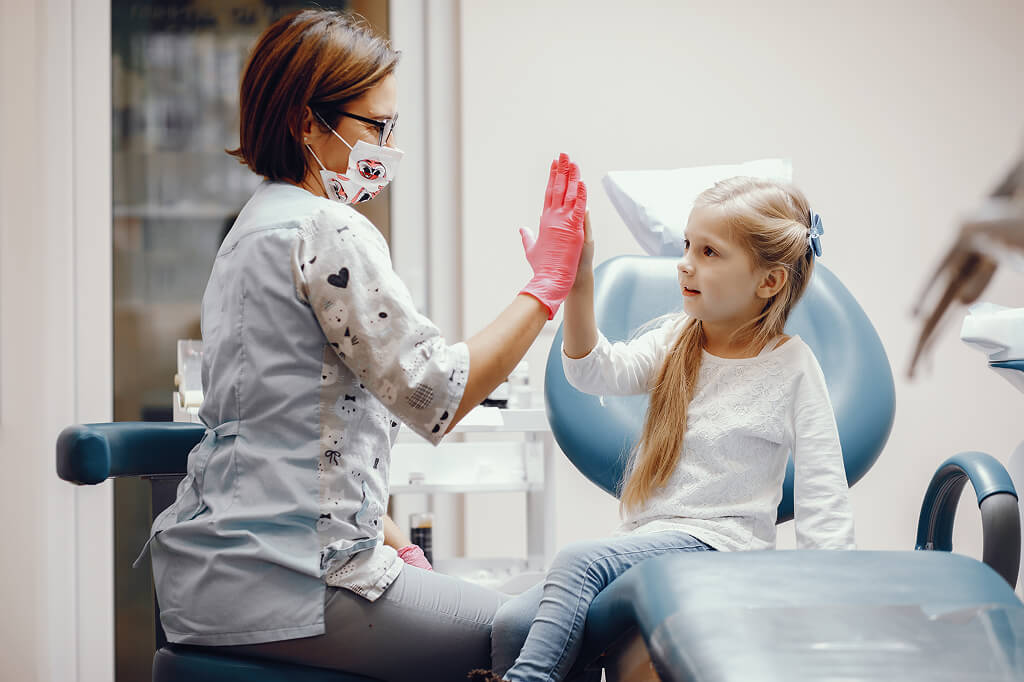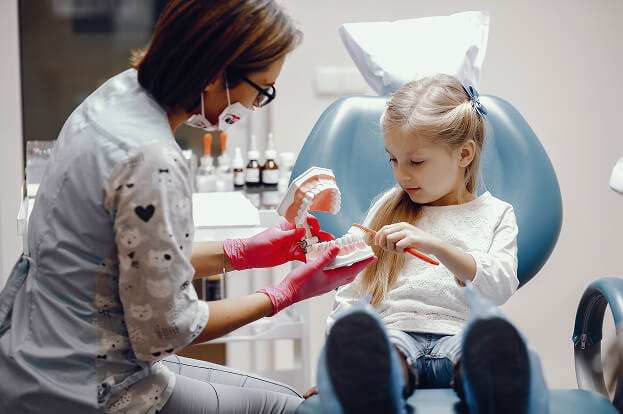Ballantyne Pediatric Dentistry
Menu
Ballantyne Pediatric Dentistry

Many parents assume that because baby teeth eventually fall out, early dental care isn’t a priority. However, these first teeth serve as the foundation for a child’s oral health, influencing speech development, jaw growth, and the alignment of permanent teeth. Delaying dental visits can lead to undetected cavities, improper chewing habits, and even behavioral associations that make future dental care more stressful.
This guide will explore when a child should have their first dental visit, what parents can expect, and how early check-ups contribute to a lifetime of strong, healthy smiles. Whether your child is an infant or a toddler, taking the right steps now can prevent costly and painful dental issues in the future.
Many parents wait until their child has a full set of baby teeth or experiences a dental issue before scheduling their first appointment. However, the recommended age for a child’s first dental visit is much earlier—by their first birthday or within six months of the first tooth emerging. This guideline, set by the American Academy of Pediatric Dentistry (AAPD), helps prevent oral health problems before they start.
Baby teeth might seem temporary, but they play a crucial role in guiding permanent teeth into place, aiding speech development, and ensuring proper chewing. Delaying early dental visits increases the risk of early childhood cavities, which can spread quickly in young children. Surprisingly, tooth decay is one of the most common chronic conditions in children, often developing unnoticed until discomfort appears.
A child’s first dental check-up timing is also an opportunity for parents to learn how to care for their child’s teeth properly. Many parents unknowingly contribute to dental issues through habits like prolonged bottle use at bedtime or over-reliance on sippy cups filled with sugary drinks. A pediatric dentist can provide personalized guidance on teething, fluoride use, and nutritional choices that support strong, healthy teeth.
By prioritizing early dental visits for infants, parents can establish a proactive approach to oral health, preventing small concerns from becoming major issues in the future.
A child’s first dental visit isn’t about drilling or fillings—it’s about prevention, education, and building comfort with dental care. Parents should expect a gentle, stress-free introduction to the dental environment, helping their child establish a positive association with oral health.
During this visit, the pediatric dentist will perform a quick but thorough oral examination to check for early signs of decay, gum health, and proper jaw development. The dentist may also assess habits like thumb-sucking, pacifier use, and tongue posture, which can influence a child’s bite and future alignment. Unlike adult dental exams, this visit focuses on guidance for parents as much as checking the child’s teeth.
If a child has existing teeth, a pediatric hygienist may gently clean them to remove plaque buildup and demonstrate proper cleaning techniques. For children who show anxiety, dentists often use a “tell-show-do” approach—explaining each step in a friendly, engaging way before performing it.
This visit is also a chance to normalize dental care at an early age. When children start seeing a dentist young, they are less likely to develop dental anxiety and more likely to maintain lifelong oral health habits.

Many parents view early dental visits as optional, but baby teeth play a much bigger role than just holding space for adult teeth. They influence everything from speech development to digestion, and neglecting them can have long-term effects. By the time children start school, over 50% have already developed cavities—often unnoticed by parents until pain or infection sets in.
Beyond preventing cavities, early dental visits help detect developmental issues that could impact a child’s oral and overall health. A child’s first few years of dental growth can signal underlying conditions such as airway issues, misalignment, or jaw abnormalities.
Early dental care is about more than clean teeth—it lays the groundwork for a lifetime of strong oral health and confidence in the dentist’s chair.
Ignoring these signs can lead to more complex problems later. Early intervention ensures a child’s teeth develop properly and minimizes the risk of extensive dental treatments in the future.
Children should visit the dentist every six months, just like adults, but some kids may need more frequent visits depending on their oral health. Regular check-ups allow dentists to catch small issues before they become major problems, such as early cavities, enamel defects, or misaligned teeth.
For children at higher risk of cavities—such as those with a history of early decay, weak enamel, or orthodontic concerns—dentists may recommend visits every three to four months. These more frequent check-ups help monitor tooth development and provide preventive treatments like fluoride applications or sealants.
Even if a child’s teeth appear healthy, routine exams help track bite alignment, jaw growth, and potential airway issues, ensuring that any developing concerns are addressed early. Establishing this habit early reinforces the importance of lifelong dental care and helps children feel comfortable at the dentist’s office.
Dental anxiety in children often stems from fear of the unknown, sensory sensitivities, or even parental influence. Many kids associate dental visits with discomfort before ever stepping into a clinic, making early positive experiences crucial.
To ease anxiety, pediatric dentists use a “Tell-Show-Do” approach, where they explain each step in a fun, non-threatening way before performing it. Parents can also help by avoiding negative language, such as “pain” or “shot,” and instead framing the visit as an exciting experience.
For children with extreme fear, desensitization techniques—like bringing them to the office for a non-treatment visit or reading books about the dentist—can build comfort. Some clinics offer kid-friendly distractions, like TVs, headphones, or therapy dogs, to create a calm environment.
By introducing dental care in a stress-free, supportive way, children develop confidence, reducing the likelihood of avoiding dentists in adulthood.
Understanding when kids should go to the dentist is essential for setting them up for a lifetime of healthy smiles. The first dental visit by age one plays a crucial role in preventing cavities, guiding proper oral development, and creating positive dental experiences. Regular check-ups—typically every six months—help catch potential issues early, from tooth decay to bite misalignment, ensuring that small problems don’t turn into bigger concerns.
Parents play a key role in normalizing dental visits, addressing dental anxiety, and encouraging strong oral hygiene habits at home. Whether it’s your child’s first visit or they need an exam due to early warning signs, prioritizing dental care early can prevent discomfort, expensive treatments, and unnecessary stress in the future.
At Ballantyne Pediatric Dentistry, we specialize in making dental visits comfortable and engaging for kids of all ages. If you have questions about your child’s dental health or want to schedule their first visit, we’re here to help! Call us today at 704-752-1900 to book an appointment and give your child the best start for a lifetime of healthy smiles.